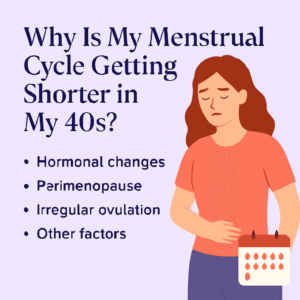Why Is My Menstrual Cycle Getting Shorter in My 40s?
Entering your 40s can feel like stepping into a new chapter of life — one filled with wisdom, confidence, and, sometimes, unexpected changes in your body. One common and often puzzling change many women notice during this decade is a shorter menstrual cycle. If you’re wondering why is your Menstrual Cycle Getting Shorter, you’re not alone. This is a natural part of the body’s transition toward menopause. Let’s dive deeper into why this happens, what it means, and when it might be a reason to consult a doctor.

Why Is My Menstrual Cycle Getting Shorter in My 40s?
The Natural Hormonal Shift
Throughout your reproductive years, your menstrual cycle is largely governed by a delicate balance of hormones — primarily estrogen and progesterone. In your 40s, your ovaries gradually begin to produce less of these hormones, particularly progesterone. Here’s how these hormonal shifts affect your cycle:
-
Lower progesterone levels: Progesterone helps regulate the second half of the menstrual cycle (the luteal phase). When progesterone levels drop, the luteal phase shortens, meaning your overall cycle becomes shorter.
-
Irregular ovulation: As the ovaries age, they don’t release eggs as regularly or predictably. Some cycles may skip ovulation entirely (anovulatory cycles), leading to changes in bleeding patterns, including earlier periods.
-
Fluctuating estrogen levels: Estrogen can spike and fall unpredictably, causing the uterine lining to build up faster or shed earlier, influencing the timing and flow of your period.
What Is Perimenopause?
The term for this transitional phase is perimenopause. Perimenopause typically starts in a woman’s 40s (though it can begin in the late 30s for some) and lasts until menopause, which is officially marked by 12 consecutive months without a period.
During perimenopause, your cycle becomes less predictable, and it’s common to experience:
-
Shorter cycles (less than 25 days)
-
Heavier or lighter bleeding
-
Skipped periods
-
More intense premenstrual symptoms (PMS)
On average, the menstrual cycle may shorten by 2-4 days initially, but the pattern can vary widely from person to person.
Other Factors That May Influence Cycle Changes
While perimenopause is the most common reason for shorter cycles in your 40s, it’s important to consider other possible factors:
-
Stress: Physical or emotional stress can affect hormone levels, disrupting the menstrual cycle.
-
Thyroid disorders: An overactive or underactive thyroid can cause menstrual irregularities.
-
Weight changes: Significant weight loss or gain can alter hormone production.
-
Medical conditions: Fibroids, polyps, or other uterine conditions can also impact cycle length and bleeding patterns.
When to See a Gynaecologists?
Changes in your cycle during your 40s are often a normal part of aging, but certain signs warrant a medical consultation:
-
Bleeding that is excessively heavy (soaking through a pad or tampon every hour)
-
Bleeding that lasts longer than 7 days
-
Spotting between periods
-
Severe pain during periods
-
A sudden, drastic change in your cycle pattern
These symptoms could indicate underlying issues such as fibroids, endometrial hyperplasia, or even early signs of other health concerns.
Coping with the Changes
Understanding that your body is going through a natural evolution can make this transition easier. Here are a few tips to manage and support your reproductive health during this time:
-
Track your cycles: Use an app or calendar to note changes in cycle length, flow, and symptoms.
-
Maintain a healthy lifestyle: Balanced nutrition, regular exercise, stress management, and sufficient sleep can help stabilize hormone levels.
-
Consider supplements: Some women benefit from supplements like magnesium, vitamin D, and omega-3 fatty acids, but always consult with a healthcare provider before starting new supplements.
-
Discuss options with your doctor: If symptoms become disruptive, treatments such as hormonal therapy, birth control pills, or other medications can help regulate cycles and ease symptoms.
The Takeaway
If you notice your periods coming closer together in your 40s, it’s most likely a normal part of the body’s transition toward menopause. Hormonal fluctuations during perimenopause are natural, but staying informed and proactive about your health is key.
At mycoctors.uk, we’re here to support you through every stage of your health journey. If you have concerns about your menstrual cycle or overall wellbeing, don’t hesitate to reach out to one of our healthcare professionals for personalized advice and care.
Why Is My Menstrual Cycle Getting Shorter in My 40s?
